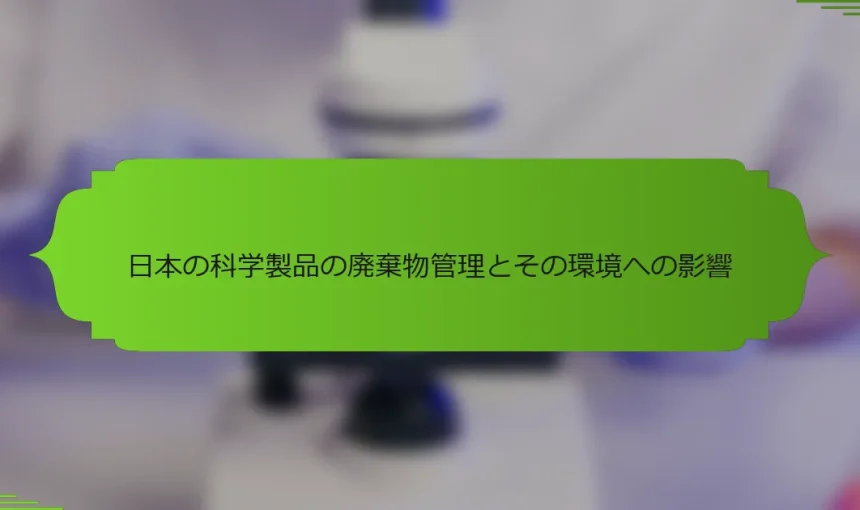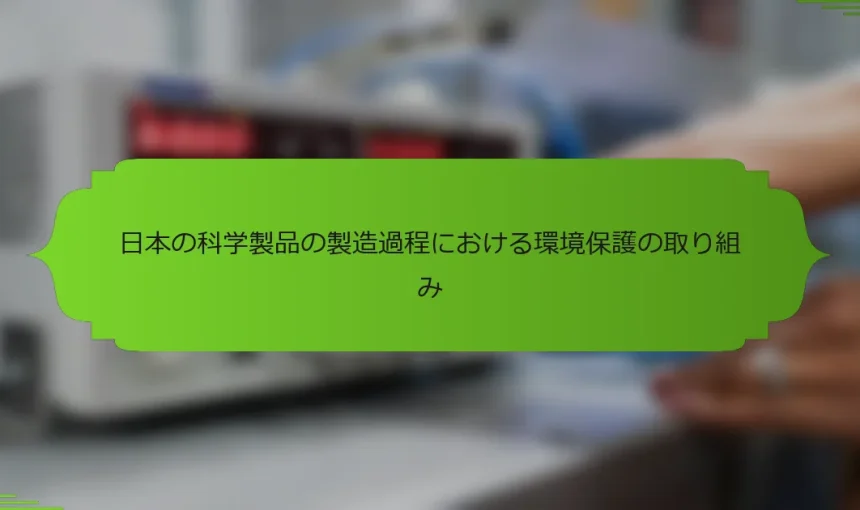The article focuses on the use of recyclable materials in Japan’s scientific products, highlighting key materials such as plastics, metals, glass, and paper. These materials can be reused or regenerated after their initial use, contributing significantly to environmental protection and sustainable resource management. The recycling rates for plastics and metals have shown notable improvement, reaching […]
The carbon footprint of scientific products in Japan refers to the total amount of carbon dioxide emissions generated throughout the lifecycle of these products, encompassing manufacturing, transportation, usage, and disposal stages. Efforts to reduce this carbon footprint include the adoption of renewable energy, improvements in manufacturing efficiency, and the promotion of recycling practices. In 2020, […]
Japan’s scientific products significantly impact the environment due to high energy consumption during manufacturing, leading to greenhouse gas emissions and potential soil and water contamination from chemical use. Improper waste disposal further exacerbates environmental burdens, and many products exhibit low recycling rates, contributing to resource wastage. In contrast, sustainable products aim to minimize environmental impact […]
Japan’s waste management for scientific products involves the systematic handling of waste generated from scientific materials, which is crucial for environmental protection and public health. Governed by the Waste Management Law, this process categorizes waste from scientific products as specially managed industrial waste, mandating proper collection, transportation, and disposal methods. The waste management process includes […]
Eco-design in Japanese scientific products focuses on environmentally conscious product design, emphasizing the use of recyclable materials and improved energy efficiency. This approach considers the entire product lifecycle, promoting waste reduction and efficient resource utilization. As consumer awareness of environmental issues rises, eco-design enhances market competitiveness for sustainable products. Sustainable development, which aims to meet […]
The article focuses on environmental protection efforts in the manufacturing processes of scientific products in Japan. Key initiatives include the adoption of sustainable manufacturing methods, such as the use of recyclable materials and improvements in energy efficiency. Waste reduction during production is emphasized, with many companies adhering to strict environmental standards. Additionally, the management of […]
Japanese scientific products demonstrate high energy efficiency, reflecting the ratio of energy consumed to output produced. These products, including energy-saving home appliances, often carry certifications such as “Energy Star” and “Eco Label,” making it easier for consumers to identify efficient options. Innovations in recycling technologies and the development of environmentally friendly materials further contribute to […]
The article examines the use of chemical substances in Japanese scientific products and the associated environmental risks. Chemical substances, which include pesticides, pharmaceuticals, and industrial chemicals, are essential for product manufacturing and functionality in Japan, where their use is strictly regulated. The article highlights the environmental risks posed by these chemicals, such as soil and […]
The environmental assessment criteria for scientific products in Japan are standards used to evaluate the impact of products on the environment throughout their entire life cycle. This includes measuring environmental burdens from raw material procurement, manufacturing, usage, to disposal. The Ministry of the Environment in Japan has established the “Evaluation Criteria for Environmentally Friendly Products,” […]








